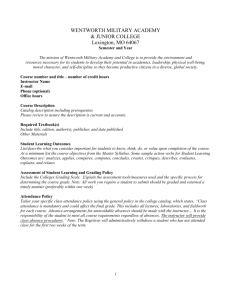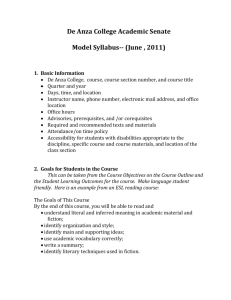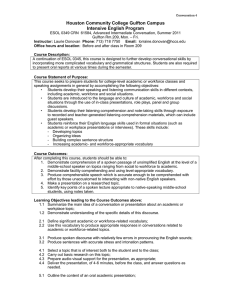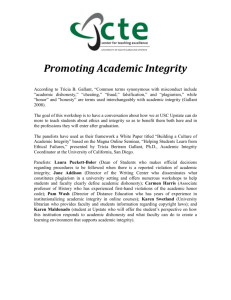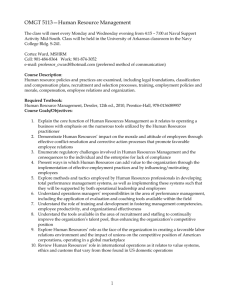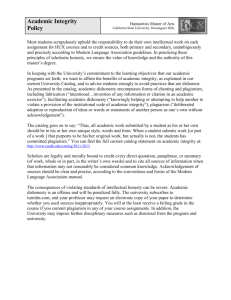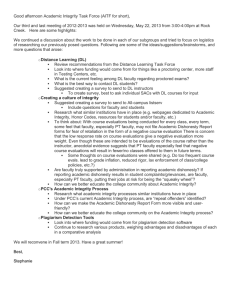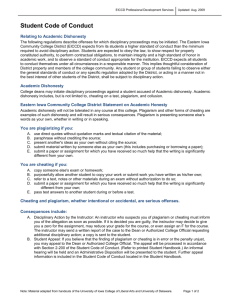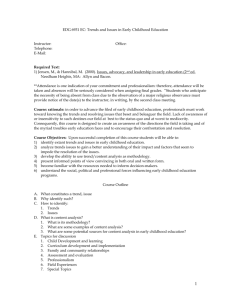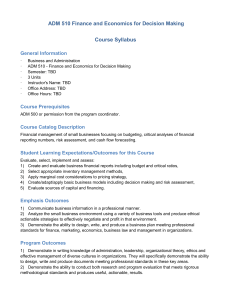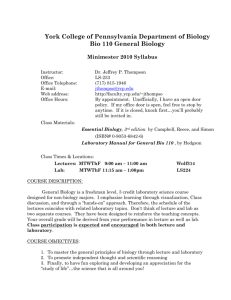MBA589-03-Spring 2014
advertisement
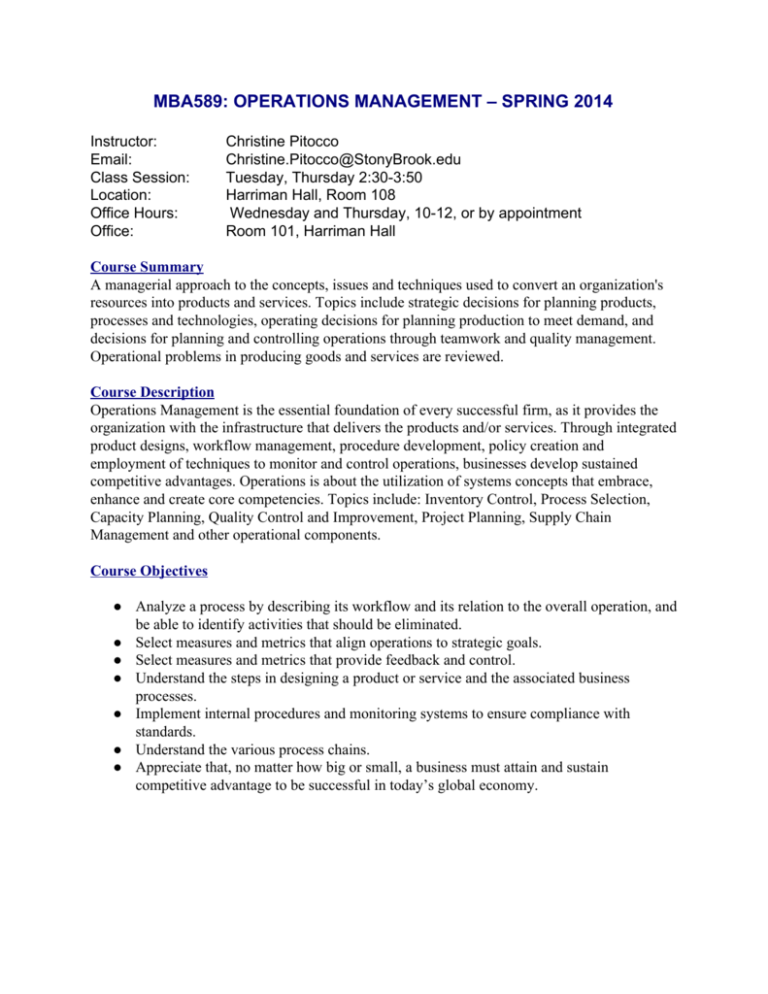
MBA589: OPERATIONS MANAGEMENT – SPRING 2014 Instructor: Christine Pitocco Email: Christine.Pitocco@StonyBrook.edu Class Session: Tuesday, Thursday 2:30­3:50 Location: Harriman Hall, Room 108 Office Hours: Wednesday and Thursday, 10­12, or by appointment Office: Room 101, Harriman Hall Course Summary A managerial approach to the concepts, issues and techniques used to convert an organization's resources into products and services. Topics include strategic decisions for planning products, processes and technologies, operating decisions for planning production to meet demand, and decisions for planning and controlling operations through teamwork and quality management. Operational problems in producing goods and services are reviewed. Course Description Operations Management is the essential foundation of every successful firm, as it provides the organization with the infrastructure that delivers the products and/or services. Through integrated product designs, workflow management, procedure development, policy creation and employment of techniques to monitor and control operations, businesses develop sustained competitive advantages. Operations is about the utilization of systems concepts that embrace, enhance and create core competencies. Topics include: Inventory Control, Process Selection, Capacity Planning, Quality Control and Improvement, Project Planning, Supply Chain Management and other operational components. Course Objectives ● Analyze a process by describing its workflow and its relation to the overall operation, and be able to identify activities that should be eliminated. ● Select measures and metrics that align operations to strategic goals. ● Select measures and metrics that provide feedback and control. ● Understand the steps in designing a product or service and the associated business processes. ● Implement internal procedures and monitoring systems to ensure compliance with standards. ● Understand the various process chains. ● Appreciate that, no matter how big or small, a business must attain and sustain competitive advantage to be successful in today’s global economy. Text books Operations Management in the Supply Chain, Decisions and Cases , Roger G. Schroeder, Susan Meyer Goldstein, and M. Johnny Rungtusanatham, Sixth Edition, McGraw­Hill, ISBN 978­0­073­52524­2. THE GOAL:PROCESS OF ONGOING IMPROVEMENT Author: GOLDRATT, Publisher: NORTH RIVER, 3RD EDITION ISBN 978­0­884­27195­6 NOTE: Earlier editions of either text are acceptable, and it will be the student’s responsibility to read the correct assignments. . Grading Policy Your grade will be posted on Blackboard and will be based on the following: ● Exam One 20 % ● Exam Two 20% ● Exam Three 20% ● Final Presentation 25% ● Class Discussion/ Participation 10% ● Peer evaluation 5% Assignments It is important that you read the assigned chapter prior to class. If a case study or article is assigned, please read the case (or article) and answer the questions that follow. Your participation in the discussion of the chapter and the review of the case studies will factor significantly into your overall grade for the course. Exams Exams will be given as per the course schedule, in a format that is generally a combination of multiple choice, short answer and essay questions. The specific format of each exam will be disclosed to the class prior to the exam date. To prepare for an exam, students are expected to review their notes, the textbook, and the slides on Blackboard. There is no time allotted for review sessions. If you have questions or lack an understanding of any of the material, please ask me to review the topic in class, see me during office hours, or email or call me to make an appointment. Final Presentation Students will be assigned to teams and present a case study of a business or organization that had to deal with a major Operations challenge (e.g. install an ERP system, develop a new product, redesign an existing process, deal with excess or lack of inventory, implement lean and/or Six Sigma, address a quality problem, capacity issue, etc.) YOU MAY USE ANY LEGITIMATE SOURCE OF INFORMATION AS LONG AS YOU CITE ANY AND ALL REFERENCE MATERIAL USED IN YOUR PRESENTATION. Teams are to prepare a 10­15 minute presentation (Power Point) and present it to the class. A digital copy is to be provided to the instructor prior to the start of your presentation. The presentation should familiarize us with the organization and the crisis it faced, describe in detail the measures taken to deal with the situation and why that particular path was chosen, the results achieved, and how this particular case study relates to the material covered during the semester. Use the case studies we discussed in class as a reference for the format of the presentation. Note that 5% of your grade will be based on your teammates’ assessment of your contribution to the presentation. Important Information Absences We cover a substantial amount of material in this course; therefore an absence will impact your performance in class and on exams. If you have an absence, you are responsible for the material and should obtain the notes from a classmate– please do not email me after the fact and ask me what you missed. As a courtesy to your fellow students, you must attend all final presentations (unless excused by the instructor). Any student that is absent, arrives substantially late or leaves early on presentation days will receive a 0% in class participation, regardless of prior performance in class. Electronic Devices Laptops are useful in class to follow the slide presentation and the textbook, take notes and look up relevant information. If you are using your laptop for other purposes, you will be asked to shut it down for the duration of the class. Texting and cell phone use during class is prohibited. Please make sure all cell phones are turned off upon arrival to class. If a cell phone is on (ringing or vibrating) during an exam, the person will receive a score of zero for that exam. Extra Credit There will be no extra­credit assignments. Disabilities If you have a physical, psychological, medical or learning disability that may impact on your ability to carry out assigned course work, I urge you to contact the staff in the Disability Support Services Office (DSS), Room 128, Educational Communications Center (ECC), Telephone No. 632­6748. DSS will review your concerns and determine with you what accommodations are deemed necessary and appropriate. All information and documentation concerning your disability is confidential. The College of Business Statement Regarding Academic Dishonesty The College of Business regards any act of academic dishonesty as a major violation punishable by severe penalties, including dismissal from the University. University policy requires that instructors report all suspected cases of academic dishonesty to the appropriate Academic Judiciary Committee, which is empowered to take strong action against violators. Under no circumstances will the College of Business permit cheating of any kind. Many activities constitute academic dishonesty. The following list is not inclusive, only suggestive: Examinations: ▪ Referring in any way to the examination paper of another student. Use of materials (notes, books, etc.) not explicitly permitted by the instructor. ▪ The exchange of any information concerning the examination with any other person after the examination has begun. Papers: ▪ The submission in whole or part of the work of another person as if it were your own. ▪ The citation of the work of others without proper reference and credit. In General: ▪ Copying without quotation marks or paraphrasing without acknowledgment from the writing of someone else. ▪ Using someone else’s facts or ideas without acknowledgment. ▪ Submitting work in one course that you submitted for credit in another course without the permission of both instructors. It is plagiarism when you pass off the work of others as though it were your own . You can strengthen your paper by using material by others – as long as you acknowledge your use and use that material as a building block for your own thinking rather than a substitute for it. When you use published words, data, or thoughts, you must footnote your use. If you are considering any act of academic dishonesty, the College of Business advises you in the strongest possible terms to abstain. The consequences associated with academic dishonesty are substantial and can literally ruin your career. DON’T DO IT . The University insists that instructors report every case of plagiarism to the Academic Judiciary Committee, which keeps records of all cases. The recommended penalty for plagiarism is failure for the course and possible expulsion from the University . Unintentional plagiarism is still plagiarism; you cannot plead ignorance. Therefore, if you have any questions about the proper acknowledgment of help, be sure to ask your instructor. For more comprehensive information on academic integrity, including categories of academic dishonesty, please refer to the academic judiciary website at http://www.stonybrook.edu/uaa/academicjudiciary/ Date 1/28 Topic Introduction/Overview Operation Function Assignment Read Chapter 1 Assignment: Visit the website : http://www.monster.com . What career opportunities can be found in the field of Operations Management. Come to class prepared to discuss at least two jobs you found. 1/30 Operation and Supply Chain Strategy 2 Assignment: Read article:Corporate Social Responsibility in the Supply Chain: An Application in the Food Industry. Come to class prepared to discuss article. 2/4 Product Design 3 Assignment: Read Articles for next class discussion (1) International diversification of manufacturing operations (2) Performance implications and moderating forces (3) Supply Chain Collaboration: Evolution Management Framework 2/6 Article Discussion 2/11 Process Selection 4 2/13 Service Delivery System Design 5 2/18 Process­Flow Analysis 6 Assignment: Read Case Study: Eastern Gear, Inc 2/20 Case Study Discussion Eastern Gear Inc. 2/25 Exam 1 2/27 Managing Quality 8 Assignment: Read Case Study: The Mount Rundle Hotel Banff 3/04 Case Study: The Mount Rundle Hotel Banff 3/6 Quality Control and Improvement 9 Assignment: Read Case Study: Six Sigma at 3M, Inc. 3/11 Case Study: Six Sigma at 3M, Inc. 3/13 Lean Thinking and Lean Systems 3/18, 3/20 No Class 7 Assignment: Read: The Goal 3/25 Discussion: The Goal 3/27 Supply Chain Management 10 Assignment: Read Corporate Social Responsibility Reports: A Thematic Analysis related to Supply Chain Management 4/1 Forecasting 11 Assignment: Read “Demand Forecasting Behavior: System Neglect and Change Detection 4/3 Capacity Planning 12, 13 4/8 Exam 2 4/10 Project Planning and Scheduling 14 4/15 Project Management/Project Planning 14 4/17 Inventory Management 15 Assignment: Read article: Lessons to Learn for 2014 after Shutdown Crisis Narrowly Avoided and Common inventory modeling assumptions that fall short: Arborescent networks, Poisson demand, and single­echelon approximations 4/22 Independent Demand Inventory 15 4/24 MRP,ERP 16 4/29 Exam 3 5/1 Presentation/ Preparation 5/6 Presentations 5/8 Presentations 5/13 Presentations 5/15 Presentations
